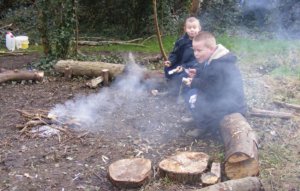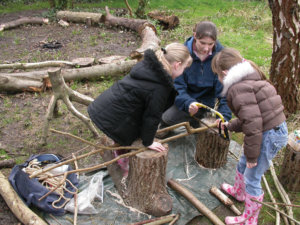 Working with children and inspiring them about wildlife is a big part of the work of the Hampshire & Isle of Wight Wildlife Trust. A really interesting project is underway on the Isle of Wight as the Wildlife Trust works with Barton School to promote the Island’s first Forest School.
Working with children and inspiring them about wildlife is a big part of the work of the Hampshire & Isle of Wight Wildlife Trust. A really interesting project is underway on the Isle of Wight as the Wildlife Trust works with Barton School to promote the Island’s first Forest School.
Forest School is a method of teaching in an outdoor classroom, usually a woodland, where children are given opportunities to explore the natural environment throughout the seasons through games and activities. They are set small, achievable tasks, promoting independence, and raising self-confidence and self esteem.
Typical activities include outdoor cooking, art work using natural materials, using tools to make wooden items such as whistles, charcoal making, designing and building shelters, taking part in scavenger hunts and playing sensory games.
Each group attends Forest School for at least six two hour sessions, usually at weekly intervals. The leaders are trained to support child-centred learning and recognise different learning styles, helping the children to build up their skills. High staffing ratios ensure the children are able to fully participate in the activities, including using tools, in a safe and secure setting. Forest School can be adapted to suit children in the Foundation Stage through to young adults and has been found to be particularly valuable to youngsters who struggle with the confines of a traditional classroom.
Forest School leader, and Hampshire & Isle of Wight Wildlife Trust Education Officer, Kathy Grogan is thrilled with the results of the project.
“Barton School was a great place to start – it’s a real community school where staff are very aware of the needs of the individual child.” said Kathy. “Children always love outdoor activities, but Forest School takes them a bit further than the usual bug hunts and pond dipping. They have particularly enjoyed cooking on the campfire and using tools, and some have really relished the opportunity to get muddy!”
 For the qualified leaders there are the usual required skills for leading any group of children. Kathy adds that, “The most important thing is that you are comfortable in the outdoors – if getting muddy, smelling of wood smoke, wearing waterproofs and woollies and getting up close and personal with a variety of creepy crawlies fills you with dread then it really isn’t for you! As a leader you need to be flexible in your approach so that the children are allowed to explore and discover things for themselves.”
For the qualified leaders there are the usual required skills for leading any group of children. Kathy adds that, “The most important thing is that you are comfortable in the outdoors – if getting muddy, smelling of wood smoke, wearing waterproofs and woollies and getting up close and personal with a variety of creepy crawlies fills you with dread then it really isn’t for you! As a leader you need to be flexible in your approach so that the children are allowed to explore and discover things for themselves.”
Activities dovetail into the National Curriculum and links can occur in surprising ways. Kathy explains, “We create ‘tree faces’ – a kind of outdoor art using mud and other natural materials. I get the children to make them and they are encouraged to invent names and situations for their tree monsters – ideas we can take back to the fire circle and develop into oral stories – hey presto! An al fresco Literacy class, often led most enthusiastically by children who struggle to write a few lines of a composition in class.”
Curriculum links are sometimes set up in the lesson plan but often occur spontaneously and Kathy outlines a good example with maths. “Estimating lengths of wood as we cut them; working out in our heads how many 30cm pieces we’ll get out of a length. Using mathematical language regarding shapes when we’re making things like mallets – first we make a ‘cylinder’ and then we cut a ‘square’ handle. We cut the corners off that to end up with an ‘octagon’. We talk a lot about angles as well, getting the correct angle of the knife to whittle wood.”
 All this is all especially important for people who learn by doing. Often for them, things don’t really make much sense until they use the information in a physical way. Through observation, Forest School leaders can identify different kinds of learners and make sure activities in each session are suited to the needs of the individual.
All this is all especially important for people who learn by doing. Often for them, things don’t really make much sense until they use the information in a physical way. Through observation, Forest School leaders can identify different kinds of learners and make sure activities in each session are suited to the needs of the individual.
Kathy sums up the programme, “The children learn a lot, and get excited about the access to nature. I firmly believe that children shouldn’t miss out on the fantastic natural resources we all have on our doorstep.”
With Lottery funding it is hoped to expand the project and make use of suitable Forestry Commission and Wildlife Trust sites. For further information contact Kathy Grogan on (01983) 529199 or email kathyg@hwt.org.uk.



